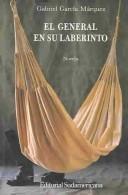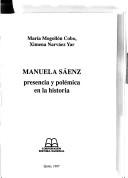| Listing 1 - 5 of 5 |
Sort by
|

ISBN: 843971579X Year: 1989 Publisher: Madrid : Mondadori España,
Abstract | Keywords | Export | Availability | Bookmark
 Loading...
Loading...Choose an application
- Reference Manager
- EndNote
- RefWorks (Direct export to RefWorks)
Spanish-American literature --- Bolívar, Simón, --- Fiction --- Roman --- Bolivar, Simon --- -Fiction --- Fiction. --- Bolívar, Simón, --- Būlīvār, Simūn, --- Bolívar Palacios, Simón, --- Palacios, Simón Bolívar, --- Būlīfār, Sīmūn, --- Libertador, --- Liberator, --- בוליבר, סימון, --- Bolívar y Palacios, Simón José Antonio de la Santísima Trinidad de, --- Palacios, Simón José Antonio de la Santísima Trinidad de Bolívar y,
Book
ISBN: 2753502218 2753532311 Year: 2006 Publisher: Presses universitaires de Rennes
Abstract | Keywords | Export | Availability | Bookmark
 Loading...
Loading...Choose an application
- Reference Manager
- EndNote
- RefWorks (Direct export to RefWorks)
Républiques en armes questionne un récit officiel, celui de la naissance des nations hispano-américaines. Car les républiques de Colombie et du Venezuela ne procèdent ni d’un protonationalisme ancien, ni d’une rivalité entre « Créoles » d’Amérique et « Espagnols » européens. Il est, à l’origine, la conséquence de l’effondrement inattendu de la Monarchie hispanique après l’invasion de la péninsule Ibérique par Napoléon en 1808. Nourri par des recherches dans les archives colombiennes, espagnoles et vénézuéliennes et à travers l’étude prosopographique de plus de 3 800 soldats, l’ouvrage décrit les changements sociopolitiques de l’institution militaire. Les milices inexpertes de 1810 cèdent la place aux guérillas puis à la grande armée libératrice – l’Ejército Libertador de Simón Bolívar. Victorieuses à Boyacá, Carabobo, Pichincha, Junín et Ayacucho, les légions bolivariennes arrachèrent les indépendances du Venezuela, de la Colombie, du Panama, de l’Equateur, du Pérou et de la Bolivie actuels. Dans la construction des nations, les troupes patriotes devinrent les piliers du projet révolutionnaire des élites libérales. Vecteurs des valeurs politiques modernes, les forces armées en vinrent à constituer la matrice d’un Peuple « régénéré ». Elles servirent alors de base symbolique, politique et sociale à la souveraineté des nouveaux états indépendants. Républiques en armes aborde les origines d’une histoire dramatiquement ouverte et propose une réflexion sur l’origine des systèmes politiques et des identités nationales du Venezuela et de la Colombie.
Regions & Countries - Americas --- History & Archaeology --- Latin America --- Bolívar, Simón, --- Venezuela --- Colombia --- History --- Būlīvār, Simūn, --- Bolívar Palacios, Simón, --- Palacios, Simón Bolívar, --- Būlīfār, Sīmūn, --- Libertador, --- Liberator, --- בוליבר, סימון, --- Bolívar y Palacios, Simón José Antonio de la Santísima Trinidad de, --- Palacios, Simón José Antonio de la Santísima Trinidad de Bolívar y, --- naissance d'une nation --- conflit sociopolitique --- indépendance --- système politique --- autonomie --- identité nationale
Book
ISBN: 0292793944 0292718292 029272151X Year: 2008 Publisher: Austin : University of Texas Press,
Abstract | Keywords | Export | Availability | Bookmark
 Loading...
Loading...Choose an application
- Reference Manager
- EndNote
- RefWorks (Direct export to RefWorks)
She was a friend, lover, and confidante of charismatic Spanish American independence hero Simón Bolívar and, after her death, a nationalist icon in her own right. Yet authors generally have chosen either to romanticize Manuela Sáenz or to discount her altogether. For Glory and Bolivar: The Remarkable of Life of Manuela Sáenz, by contrast, offers a comprehensive and clear-eyed biography of her. Based on unprecedented archival research, it paints a vivid portrait of the Quito-born "Libertadora," revealing both an exceptional figure and a flesh-and-blood person whose life broadly reflected the experiences of women during Spanish America's turbulent Age of Revolution. Already married at the time of her meeting with the famous Liberator, Sáenz abandoned her husband in order to become not only Bolívar's romantic companion, but also his official archivist, a member of his inner circle, and one of his most loyal followers. She played a central role in Spanish South America's independence drama and eventually in developments leading to the consolidation of new nations. Pamela Murray, for the first time, closely examines Sáenz's political trajectory including her vital, often-overlooked years in exile. She exposes the myths that still surround her. She offers, in short, a nuanced and much-needed historical perspective, one that balances recognition of Sáenz's uniqueness with awareness of the broader forces that shaped this dynamic nineteenth-century woman.
Mistresses --- Sáenz, Manuela, --- Bolívar, Simón, --- Relations with women. --- South America --- History --- Lovers (Mistresses) --- Concubinage --- Paramours --- Būlīvār, Simūn, --- Bolívar Palacios, Simón, --- Palacios, Simón Bolívar, --- Būlīfār, Sīmūn, --- Libertador, --- Liberator, --- בוליבר, סימון, --- Bolívar y Palacios, Simón José Antonio de la Santísima Trinidad de, --- Palacios, Simón José Antonio de la Santísima Trinidad de Bolívar y, --- Thorne, Manuela Sáenz de, --- Sáenz y Aspuru, Manuela, --- Manuela Libertad, --- Libertad, Manuela, --- La Sáenz, --- Sáenz Aizpuru, Manuela, --- Sáenz, Manuelita, --- Aizpuru, Manuela Sáenz, --- Aspuru, Manuela Sáenz y,

ISBN: 997884029X 2821844883 Year: 1997 Publisher: Institut français d’études andines
Abstract | Keywords | Export | Availability | Bookmark
 Loading...
Loading...Choose an application
- Reference Manager
- EndNote
- RefWorks (Direct export to RefWorks)
Quinto y la crisis de la alcabala (1580-1600) intenta comprender la lógica del desarrolló de este capítulo que la historiografía ecuatoriana juzga a menudo decisivo para el devenir nacional, pero que no ha sido jamás objeto de un estudio preciso. A pesar de la enorme cantidad de documentos de origen diverso que existen sobre el tema, nada nuevo se había hecho desde González Suárez y su célebre Historia General de la República del Ecuador. Bernard Lavallé reconstruve el juego complejo de los diversos elementos de una coyuntura que, en el marco del virreinato de Lima en una época bisagra de su evolución, se presenta, a partir de 1580, con cierto número de especificidades y caracteres más marcados en la región de Quito que en otras. Asi, su ínteres estriba en la posibilidad que ofrece la crisis de captar a los protagonistas en su comportamiento real, individual y colectivo; y en la comprensión de la lógica profunda de las diversas reacciones en esos:momentos claves de la vida en los que, presionadas por la prisa y la pasión, las acciones dicon más que los discursos y sobre todo con menos disimulo.
Regions & Countries - Americas --- History & Archaeology --- Latin America --- Ecuador --- Quito (Audiencia) --- History --- History. --- Real Audiencia de Quito --- Audiencia de Quito --- Royal Audience of Quito --- Sáenz, Manuela, --- Bolívar, Simón, --- Legends. --- Relations with women. --- Būlīvār, Simūn, --- Bolívar Palacios, Simón, --- Palacios, Simón Bolívar, --- Būlīfār, Sīmūn, --- Libertador, --- Liberator, --- בוליבר, סימון, --- Bolívar y Palacios, Simón José Antonio de la Santísima Trinidad de, --- Palacios, Simón José Antonio de la Santísima Trinidad de Bolívar y, --- Thorne, Manuela Sáenz de, --- Sáenz y Aspuru, Manuela, --- Manuela Libertad, --- Libertad, Manuela, --- La Sáenz, --- Sáenz Aizpuru, Manuela, --- Sáenz, Manuelita, --- Aizpuru, Manuela Sáenz, --- Aspuru, Manuela Sáenz y, --- historia política --- pueblos indígenas --- reforma
Book
ISBN: 1108216552 1108207103 1316665631 1107158478 1316610969 Year: 2017 Publisher: Cambridge : Cambridge University Press,
Abstract | Keywords | Export | Availability | Bookmark
 Loading...
Loading...Choose an application
- Reference Manager
- EndNote
- RefWorks (Direct export to RefWorks)
The American and Latin American independence movements emerged from distinctive settings and produced divergent results, but they were animated by similar ideas. Patriotic political theorists throughout the Americas offered analogous critiques of imperial rule, designed comparable constitutions, and expressed common ambitions for their new nations' future relations with one another and the rest of the world. This book adopts a hemispheric perspective on the revolutions that liberated the United States and Spanish America, offering a new interpretation of their most important political ideas. Simon argues that the many points of agreement among various revolutionary political theorists across the Americas can be attributed to the problems they encountered in common as Creoles - that is, as the descendants of European settlers born in the Americas. He illustrates this by comparing the political thought of three Creole revolutionaries: Alexander Hamilton of the United States, Simón Bolívar of Venezuela, and Lucas Alamán of Mexico.
Creoles --- Racially mixed people --- History. --- Hamilton, Alexander, --- Bolívar, Simón, --- Alamán, Lucas, --- Būlīvār, Simūn, --- Bolívar Palacios, Simón, --- Palacios, Simón Bolívar, --- Būlīfār, Sīmūn, --- Libertador, --- Liberator, --- בוליבר, סימון, --- Bolívar y Palacios, Simón José Antonio de la Santísima Trinidad de, --- Palacios, Simón José Antonio de la Santísima Trinidad de Bolívar y, --- Camillus, --- No Jacobin, --- Pacificus, --- Philo Camillus, --- Phocion, --- Han-mi-erh-teng, Ya-li-shan-ta, --- Gamilʹton, Aleksandr, --- Hamilton, Aleksander, --- Hamilton, A. --- Khamiltŭn, Aleksandŭr, --- Crassus, Lucius, --- Americanus, --- Political and social views. --- United States --- Latin America --- Asociación Latinoamericana de Libre Comercio countries --- Neotropical region --- Neotropics --- New World tropics --- Spanish America --- History --- Politics and government --- Autonomy and independence movements.
| Listing 1 - 5 of 5 |
Sort by
|

 Search
Search Feedback
Feedback About
About Help
Help News
News